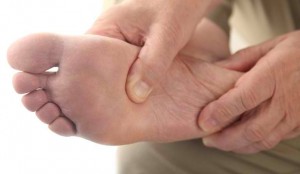What is this sharp heel pain I have?
The most common injury causing heel pain is Plantar Fasciits. Plantar fasciitis is a condition causing heel pain. Supporting the arch, the plantar fascia, a thick band of tissue connecting the heel to the ball of the foot, can become inflamed or can tear. You experience pain when you put weight on your foot—particularly when taking your first steps in the morning. The pain can be felt at the heel, or along the arch and the ball of the foot. Plantar fasciitis is a common foot condition. It occurs in as many as 2 million Americans per year and 10% of the population over their lifetimes.

What causes heel pain and this burning sensation in my heel?
Common factors that contribute to the development of plantar fasciitis include:
- Age (over 40 years)
- A job, sport, or hobby that involves prolonged standing or other weight-bearing activity
- Rapid increases in length or levels of activity, such as beginning a new running program or changing to a job that requires a lot more standing or walking than you are accustomed to
- Decreased calf muscle flexibility
- Increased body weight (Body Mass Index greater than 30)
- Tendency to have a flat foot (pronation)
Plantar fasciitis affects people of all ages, both athletes and non-athletes. Men and women have an equal chance of developing the condition.
What is Plantar Fasciitis?
Plantar fasciitis is a condition causing heel pain. Supporting the arch, the plantar fascia, a thick band of tissue connecting the heel to the ball of the foot, can become inflamed or can tear. The condition develops when repeated weight-bearing activities put a strain on the plantar fascia. People who are diagnosed with plantar fasciitis also may have heel spurs, a bony growth that forms on the heel bone. However, people with heel spurs may not experience pain.

Plantar fasciitis occurs most frequently in people in their 40s but can occur in all age groups.
The condition can develop in athletes who run a great deal and in non-athletes who are on their feet most of the day, such as police officers, cashiers, or restaurant workers.
The onset of symptoms of plantar fasciitis frequently occurs with a sudden increase in activity. You might feel a stabbing pain on the underside of your heel, and a sensation of tightness and/or tenderness along your arch.
People with plantar fasciitis may experience pain:
- In the morning, when stepping out of bed and taking the first steps of the day
- With prolonged standing
- When standing up after sitting for awhile
- After an intense weight-bearing activity such as running
- When climbing stairs
- When walking barefoot or in shoes with poor support
As your body warms up, your pain may actually decrease during the day but then worsen again toward the end of the day because of extended walking. Severe symptoms may cause you to limp.
How Is heel pain and plantar fasciitis diagnosed?
The physical therapist’s diagnosis is based on your health and activity history and a clinical evaluation. Your therapist also will take a medical history to make sure that you do not have other possible conditions that may be causing the pain. Sharing information about the relationship of your symptoms to your work and recreation, and reporting any lifestyle changes, will help the physical therapist diagnose your condition and tailor a treatment program for your specific needs.
To diagnose plantar fasciitis, your therapist may conduct the following physical tests to see if symptoms occur:
- Massaging and pressing on the heel area (palpation)
- Gently stretching the ankle to bend the top of the foot toward the leg (dorsiflexion)
- Gently pressing the toes toward the ankle
How can a Physical Therapist fix my heel pain?
Physical therapists are specially trained to evaluate and treat your plantar fasciitis and can get rid of your heel pain.

When you are diagnosed with plantar fasciitis, your physical therapist will work with you to develop a program to decrease your symptoms that may include:
- Stretching exercises to improve the flexibility of your ankle and the plantar fascia
- Use of a night splint to maintain correct ankle and toe positions
- Selection of supportive footwear and/or shoe inserts that minimize foot pronation and reduce stress to the plantar fascia
- Application of ice to decrease pain and inflammation
- Iontophoresis (a gentle way to deliver medication through the skin)
- Taping of the foot to provide short-term relief
Research shows that most cases of plantar fasciitis improve over time with these conservative treatments, and surgery is rarely required.
Can you fix my heel pain and prevent it from coming back?
Guidelines for the prevention or management of plantar fasciitis include:
- Choosing shoes with good arch support
- Replacing your shoes regularly, so that they offer arch support and provide shock absorption to your feet.
- Using a thick mat if you must stand in one place for much of the day
- Applying good principles to your exercise program, such as including a warm-up and gradually building up the intensity and duration of your exercises to avoid straining the plantar fascia
- Stretching your calves and feet before and after running or walking
- Maintaining a healthy body
If you or someone you know is experiencing heel pain that is not going away and that first step out of bed is still painful, call now at 407-494-8835 for a COMPLIMENTARY CONSULTATION for our proven Heel Pain and Plantar Fasciitis program ! See how are patients are resolving their heel pain with no injections and no surgeries!
Great physical therapist, I’ve tried EVERYTHING for my plantar fasciitis and gotten numerous injections, but Ron was the first doctor to actually look at my foot and asses the actual cause and show me how to fix it rather than just tell me to stop running and have it come back again! I would definitely recommend him to anyone with any kind of sports injury! He’s great, PLEASE go see him!!!! He will be worth your time. Best doctor I’ve seen hands down! My foot is so much better! I’m running virtually pain free for the first time in 6 months.
Kerry G.
Get the high quality One-on-One treatment you deserve and get out of pain today!


References:
A Physical Therapist’s Guide to Plantar Fascitiis: http://www.moveforwardpt.com/SymptomsConditionsDetail.aspx?cid=a2395ee9-08bb-47cc-9edc-1943e2fdbf2e#.U1pRSvldWzk
 Plantar fasciitis occurs most frequently in people in their 40s but can occur in all age groups.
The condition can develop in athletes who run a great deal and in non-athletes who are on their feet most of the day, such as police officers, cashiers, or restaurant workers.
Plantar fasciitis occurs most frequently in people in their 40s but can occur in all age groups.
The condition can develop in athletes who run a great deal and in non-athletes who are on their feet most of the day, such as police officers, cashiers, or restaurant workers.
 When you are diagnosed with plantar fasciitis, your physical therapist will work with you to develop a program to decrease your symptoms that may include:
When you are diagnosed with plantar fasciitis, your physical therapist will work with you to develop a program to decrease your symptoms that may include:
 References:
A Physical Therapist’s Guide to Plantar Fascitiis: http://www.moveforwardpt.com/SymptomsConditionsDetail.aspx?cid=a2395ee9-08bb-47cc-9edc-1943e2fdbf2e#.U1pRSvldWzk
References:
A Physical Therapist’s Guide to Plantar Fascitiis: http://www.moveforwardpt.com/SymptomsConditionsDetail.aspx?cid=a2395ee9-08bb-47cc-9edc-1943e2fdbf2e#.U1pRSvldWzk








